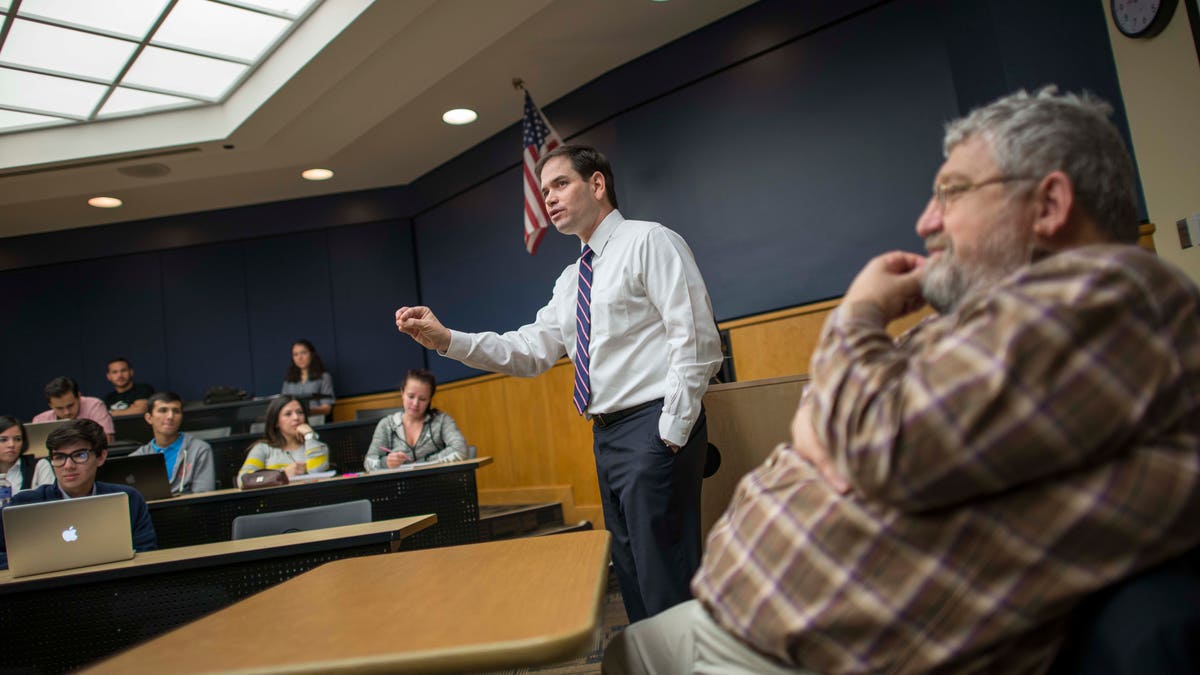
MIAMI, FL - FEBRUARY 9: Day in the life of Senator Marco Rubio on February 9, 2015 in Miami, Florida. Senator Rubio and his co professor, Dario Moreno (R) teach political science to their class at Florida International University. (Photos by Charles Ommanney for the Washington Post) (2015 The Washington Post)
Marco Rubio was discussing the middle class, student loans, the increasingly elusive American Dream, the growing Latino share of the electorate in many parts of the country.
His audience listened, taking notes.
This was Rubio in his lesser known role – that of professor.
Twice a week, the 43-year-old Republican teaches political science at Florida International University. The classes, Politico notes, “double as a focus group for the campaign themes and rhetorical flourishes he might use in a 2016 White House campaign.”
FIU provides Rubio a kind of safe space for ruminating about what a candidate needed to do in the past to win an election, compared to what he or she would have to do today.
He can, in essence, think aloud while those listening and looking to him as an icon press for more detail, or sometimes even challenge his premise.
In one class, for instance, Rubio spoke about how a candidate’s persona can go a long way in winning over voters, even unlikely ones.
“The personality of the candidates themselves is so important,” Rubio said to the class, according to the Washington Post, which observed one. “It’s an unquantifiable quality that people look at you and say, ‘I’m voting for so-and-so because there is something about him that I like.’”
The Post said a student then raised her hand, and asked: “Do we spend too much time looking at a politician’s character rather than the actual issues?”
Rubio responded: “I don’t know if it should be that way or not. But it is.”
Rubio is, essentially, a lecturer. He does not stick to a syllabus. Someone else grades assignments and exams.
He said he feels very much at home with FIU students, whom he has taught since 2008, when he left the Florida legislature. He told both Politico and the Washington Post that he empathizes with the students, most of whom are Latino and African-American from low-income or lower-middle-class families.
“I really like teaching these kids because they come from where I came from,” he told the Post.
Dario Moreno, who is Rubio’s friend and co-teacher, said the university gives the senator who is always in the limelight a stress-free zone for discussing politics.
“This is one of the few moments in the week when Marco can sit down and think through the issues,” Moreno said to Politico. “It’s safer for him to do it here than in Washington or in a room full of journalists. But I always remind him that he’s always on the record.”
Rubio tries not to make his talks personal. He often describes political types without mentioning names, though it wouldn’t be too hard to figure out who is in his mind, according to reports.
He’ll discuss Bill Clinton’s strengths as well as those of Ronald Reagan.
And he acknowledges the GOP’s challenge in overcoming its image as anti-minority.
“Despite your message, you can’t get through [to minority voters] because they’re convinced you hate them,” he said in a recent lecture, according to Politico. “That’s going to be a problem, too.”
His students seem pretty sure that their professor has designs on running for president.
At the same time, they speak admiringly about his apparent determination to keep things academic.
“At first thought, I expected it to be biased — that it would be more of a campaign,” the Post quoted student Nicole Betancourt, 21, as saying. “If anything, he teaches us like he’s an actual professor.”
And Politico found the same sentiment in student Ed Cabrera, 22.
“Marco knows a lot. You don’t get the sense that he’s a Republican or Democrat. And you don’t get the sense that he’s a senator,” said Cabrera, an independent who favors Democrats over Republicans, but told Politico he would vote for Rubio. “I never got the sense he was trying to push us to one side or another. He was unbiased.”
Follow us on twitter.com/foxnewslatino
Like us at facebook.com/foxnewslatino












































